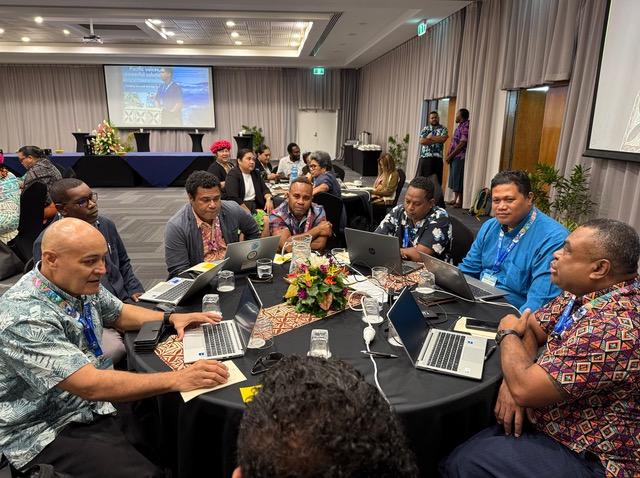
Pacific Leaders and Partners concluded Apia Climate dialogue with commitment to Stronger Action on Climate Loss, Damage, and Resilience
by Ednal Palmer
In Apia, Samoa
Pacific nations have closed a week of landmark climate talks in Apia, Samoa, with a united call for increased global support and decisive regional action to address the escalating impacts of climate change.
The back-to-back gatherings—the Second Pacific Regional Dialogue on Climate Loss and Damage (11–12 August 2025) and the Pacific Climate Change Roundtable (13–15 August 2025)—were hosted by the South Pacific Regional Environment Programme (SPREP) and brought together government leaders, technical experts, civil society representatives, and international development partners.
The meetings marked a critical moment in the Pacific’s climate response, offering a platform to exchange knowledge, coordinate strategies, and strengthen the region’s collective voice in global climate negotiations.
The Dialogue focused on urgent measures to address climate-related loss and damage, while the Roundtable expanded discussions to encompass adaptation, resilience-building, and sustainable development pathways.
Call to Take the Message to Higher-Level Discussions
Closing the weeklong event, SPREP Director General Sefanaia Nawadra urged delegates to ensure that the outcomes from the meetings are carried into high-level forums.
“We leave this meeting with a clear understanding of our action plans moving forward,” Mr. Nawadra said. “Let us return home and reflect on what we discussed, and consider how—both individually and collectively—we will take these plans forward.
“We must also bring our key messages to major upcoming gatherings, including the United Nations Environment Programme (UNEP) meeting and the Pacific Islands Forum Leaders’ Meeting.
“I hope you find the discussions useful and that they inspire ideas we can incorporate into the broader climate change architecture moving forward.”
Financing at the Forefront
The Roundtable concluded with a dedicated session on climate finance, where delegates and development partners jointly called for stronger, more predictable funding streams to help Pacific communities both withstand and recover from climate shocks.
Recognising the urgent need for resources to implement loss and damage measures, participants urged for direct access to finance, simplified application processes, and increased flexibility to meet local realities.
“Pacific communities are already living with the reality of loss and damage every day. This is not a distant threat—it’s our present,” said [Insert Name], [Insert Position] at SPREP.
“We have the expertise and commitment here in the region, but to turn plans into action, we need fair and sustained financial support from the global community.”
Commitments to Action
Across the five days of talks, delegates reaffirmed their commitment to:
- Strengthening regional coordination on loss and damage response mechanisms
- Advocating for Pacific priorities in international climate negotiations
- Scaling up adaptation measures that protect livelihoods, ecosystems, and cultural heritage
- Leveraging traditional knowledge alongside science-based solutions
- Securing long-term climate finance to sustain community resilience and recovery
Development partners echoed the urgency of these priorities, with several pledging to align their support more closely with Pacific-led strategies.
A Unified Regional Voice
The Apia meetings demonstrated the Pacific’s growing resolve to lead on climate action despite contributing the least to global greenhouse gas emissions.
As discussions closed, delegates stressed that the outcomes of both the Dialogue and the Roundtable will directly feed into preparations for upcoming international climate conferences, ensuring the Pacific’s voice is heard on the world stage.
“This is more than a call for help—it’s a call for partnership,” said Chris Teva of the Solomon Islands.
Teva added “We are not passive victims; we are active leaders. But leadership must be met with solidarity and resources if we are to secure a future where our islands can thrive.”
The week’s proceedings ended with a shared commitment: to transform words into tangible, on-the-ground action that strengthens Pacific resilience today and safeguards the region for generations to come.
